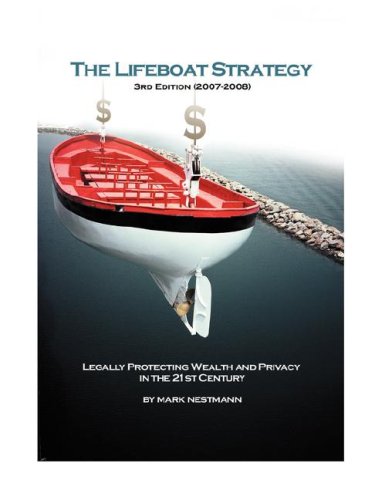Do you want to become a P.T. (a “previous taxpayer,” “perpetual tourist,” etc.)?
I did when I first read W.G. Hill’s now-classic book, P.T: A Coherent for a Stress-free, Healthy and Prosperous Life Without Government Interference, Taxes or Coercion. This libertarian manifesto claims that you can live tax-free and out of Big Brother’s reach by “living nowhere.” This strategy involves moving out of the high-tax jurisdiction in which you currently reside and then roaming the world, never staying in one place long enough to become subject to any government’s taxing authority.
Naturally, this strategy isn’t especially popular with the tax-and-spend set. And it’s become even more difficult to execute thanks to the newest campaign by the Organization for Economic Cooperation and Development (OECD) to stamp out tax avoidance: the “common reporting standard” (CRS) initiative.
The CRS is a supposedly voluntary standard that sets up legal and technical infrastructure to facilitate automatic exchange of information from financial institutions in one country to tax authorities in the country where clients of the financial institutions reside. More than 100 countries have already adopted the CRS. And while the CRS doesn’t specifically target low-tax jurisdictions, it overwhelmingly benefits high-tax countries at the expense of low-tax ones.
 PT: A Coherent for a S...
Best Price: $39.70
Buy New $110.84
(as of 02:35 UTC - Details)
PT: A Coherent for a S...
Best Price: $39.70
Buy New $110.84
(as of 02:35 UTC - Details)
US citizens and permanent residents are (mostly) unaffected by the CRS because the US hasn’t signed onto it. Uncle Sam doesn’t need the CRS, because it has the Foreign Account Tax Compliance Act (FATCA), which forces foreign financial institutions (FFIs) to send account data on US investors to the IRS. FFIs that don’t play nice with Uncle Sam must pay a 30% withholding tax on many types of US-source income and gross sales proceeds. They also risk being unable to make or receive payments in US dollars.
The OECD has now declared that second passports and second residencies are a threat to the CRS. And it’s resorted to blacklisting countries that have citizenship-by-investment (CBI) or residency-by-investment (RBI) programs, because these programs “potentially pose a high risk to the integrity of CRS.”
Seventeen jurisdictions are on this latest blacklist, including our favorite citizenship-by-investment programs offered by the Commonwealth of Dominica and the Federation of St. Kitts & Nevis.
The OECD asserts without proof that “identity cards and other documentation obtained through CBI/RBI schemes can potentially be misused to misrepresent an individual’s jurisdiction(s) of tax residence.” The blacklist announcement also warns ominously that “Financial institutions are required to take the outcome of the OECD’s analysis of high-risk CBI/RBI schemes into account when performing their CRS due diligence obligations.” That means anyone presenting an identity card from one of the blacklisted jurisdictions could have a more difficult time obtaining financial services.
The OECD’s effort to punish low-tax jurisdictions raises numerous legal and ethical issues. First, there’s the inconvenient truth (at least for the OECD) that a multilateral legal framework exists that guarantees the right of human beings to relocate to another country. For instance, the International Covenant on Civil and Political Rights states that “everyone shall be free to leave any country, including his own.”
 The Lifeboat Strategy
Best Price: $45.58
Buy New $145.95
(as of 09:40 UTC - Details)
Ethically, the blacklist is on thin ice because it seeks to enforce a double standard: none of the CBI/RBI programs in OECD member countries are included. Indeed, the OECD omitted the one RBI program designed specifically to defeat the CRS: that of OECD member Portugal. The program in Portugal offers high-net-worth individuals the opportunity to become tax-resident in Portugal while paying a different rate of tax than other Portuguese residents.
The Lifeboat Strategy
Best Price: $45.58
Buy New $145.95
(as of 09:40 UTC - Details)
Ethically, the blacklist is on thin ice because it seeks to enforce a double standard: none of the CBI/RBI programs in OECD member countries are included. Indeed, the OECD omitted the one RBI program designed specifically to defeat the CRS: that of OECD member Portugal. The program in Portugal offers high-net-worth individuals the opportunity to become tax-resident in Portugal while paying a different rate of tax than other Portuguese residents.
Finally, the blacklist is flawed because, unlike Portugal, the jurisdictions it targets don’t issue certificates of tax residence for non-residents. Take Panama, for instance. The OECD lists all three of Panama’s RBIs as having a substantial potential for abuse. But no one at the OECD appears to have investigated Panama’s residency and tax laws.
I should know, because I am a legal resident of Panama. If I wanted to obtain a certificate of tax residency there, I would need to stay in the country for 183 days or more annually.
I suspect that what really upsets the OECD is that Panama doesn’t tax its residents on their worldwide income; it only taxes their local income. That makes it’s possible for people from, say, high-tax France to take up residence in low-tax Panama and stop paying taxes to France on their non-French income.
Individuals have a right to migrate to whatever country is willing to allow them to live there under whatever conditions that country offers. If the OECD wants to stop the migration of individuals from high-tax countries to low-tax ones, it should encourage its member countries to adopt more tax-friendly policies to their residents and stop picking on the countries to which those residents are migrating.
Reprinted with permission from Nestmann.com.





